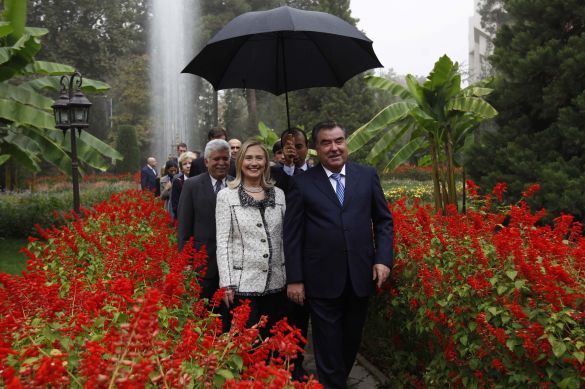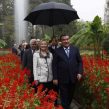
Tajikistan Prefers American Over Russian Assistance For Border Management
Publication: Eurasia Daily Monitor Volume: 8 Issue: 196
By:

Visiting Tajikistan on October 22-23, Secretary of State Hillary Clinton promised US assistance for improving the country’s border management and anti-drug enforcement, in view of growing instability in neighboring Afghanistan. Such assistance, beyond its intrinsic value, could also remove the rationale behind Moscow’s twin proposals: to deploy Russian border troops on the Tajik-Afghan border and to prolong the stationing of the Russian army’s 201st Division in Tajikistan.
President Emomali Rahmon, Foreign Minister Hamrokhon Zarifi, and other Tajik officials welcomed Clinton’s assurances that the US stood ready to provide equipment and training for border troops, customs service, and the anti-narcotics agency in Tajikistan. This had been a matter of ongoing discussion between the US and Tajik governments since well before Clinton’s visit. The current situation in Afghanistan, however, lends this issue added urgency. According to Tajik and Russian media coverage of Clinton’s visit, the narcotics trade and organized crime were publicly named by both sides as the main transnational challenges. Terrorism and Islamic fundamentalism now ranked markedly lower on the scale of perceived threats in the public pronouncements during the visit (Asia-Plus, Avesta, Interfax, October 22-24).
Clinton expressed gratitude to the Tajik government for facilitating the transportation of non-lethal equipment to US and NATO forces in Afghanistan, as part of the Northern Distribution Network (NDN). Asked whether the United States was competing with Russia over Central Asia, Clinton answered that it is not; but, “like Russia, the US has its own interests in Central Asia.” However, the NDN into Afghanistan is by definition a short-term interest; and so is the prospective NDN out of Afghanistan, now under discussion to facilitate the troop withdrawal. Longer-term US interests remain to be clarified. Some Russian government-connected analysts speculate that the US considers stationing some residual forces in Afghanistan’s north, as well as opening new military sites in Tajikistan and Uzbekistan, following the planned withdrawal of US and NATO forces from most of Afghanistan by 2014. Presumably, such sites could be part of a US policy of containing Iran and China, rather than Russia (Asia-Plus, October 19).
Tajikistan also stands to benefit from the US-backed Central Asia-South Asia (CASA) hydroelectric power transmission project. But at the same time, Tajikistan values its own ties with Iran. Coincidentally the chairman of Iran’s parliament, Ali Larijani, visited Tajikistan on October 19-20, back-to-back with Clinton’s visit. In receiving Larijani, President Rahmon and Tajik parliamentary leaders highlighted the two nations’ linguistic and historic kinship, Iranian hydropower and infrastructure projects in Tajikistan, and a proposal to connect the railways of Tajikistan and Afghanistan with those of Iran. The flow of narcotics out of Afghanistan represents a common challenge to Tajikistan and Iran (Avesta, Asia Plus, October 20, 21).
As NATO and US forces prepare to thin out and withdraw from Afghanistan, any power vacuum in the north of that country could intensify cross-border drug-trafficking and organized crime. This could reproduce the situation from the 1990’s, when local anarchy threatened to spill over Afghanistan’s northern border, well before the Taliban had imposed their rule in the north. Following that conquest, the Taliban banned the drug business on their own doctrinal considerations, and enforced the ban through their own draconian measures. Later the US and NATO forces, undermanned and reluctant to antagonize the local population or certain warlords on this issue, were unable to deal effectively with the spread of poppy cultivation and opium production. This turned Afghanistan into the producer of 90 percent of heroin traded worldwide. Some of the export routes run via Central Asia to Russia and other destinations. Among Central Asian countries, Tajikistan is the most exposed along its 1,400 kilometer border with Afghanistan.
This situation has not only contributed to Russia’s own drug problems, but also handed Moscow some international propaganda points. Russian officials are now using this argument in proposing to return Russian personnel to the Tajik-Afghan border and to prolong the basing rights of Russia’s 201st Division. Troops from that division had in the past served as surrogate border troops and back-up to Russian border troops on the Tajik-Afghan border, prior to the Russian border troops’ withdrawal from Tajikistan. Stationed near Dushanbe and in Tajikistan’s south, and manned mostly with contract soldiers at the full authorized strength, the 201st Division is Russia’s largest ground force beyond its own borders. Some 3,400 personnel (nearly one half of its strength) is being rotated in from Russia’s Central Military District and back there at the moment (Zvezda TV, October 24).
Russian President Dmitry Medvedev, visiting Dushanbe on September 3, called for prolonging the 201st Division’s basing rights for a 49-year term (the same as the extended term worked out by Medvedev for Russian forces in Ukraine and Armenia). Medvedev issued this call unilaterally at the joint news conference while Rahmon stood by, grimly silent (Interfax, September 3, 4). This demand, along with proposals to return Russian personnel to the border, has sparked intense opposition among the Tajik intelligentsia and media, including political circles close to the government. The government itself seems to oppose these Russian proposals silently, although it may also consider bargaining with Moscow, at least playing for time.
US assistance to Tajik border management would not only be more effective than Moscow’s, but would also strengthen the country’s independence, which would in turn enable it to deliver on other security agreements that the US is interested in reaching with Tajikistan.




